Related Research Articles
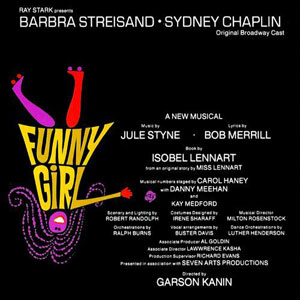
Funny Girl is a musical with score by Jule Styne, lyrics by Bob Merrill, and book by Isobel Lennart, that first opened on Broadway in 1964. The semi-biographical plot is based on the life and career of comedian and Broadway star Fanny Brice, featuring her stormy relationship with entrepreneur and gambler Nicky Arnstein.

Ethel Ruby Keeler was an American actress, dancer, and singer who was paired on-screen with Dick Powell in a string of successful early musicals at Warner Bros., particularly 42nd Street (1933). From 1928 to 1940, she was married to actor and singer Al Jolson. She retired from show business in the 1940s, but made a widely publicized comeback on Broadway in 1971.

Jean Schwartz was a Hungarian-born Jewish American composer and pianist. He is best known for his work writing the scores for more than 30 Broadway musicals, and for his creation of more than 1,000 popular songs with the lyricist William Jerome. Schwartz and Jerome also performed together on the vaudeville stage in the United States; sometimes in collaboration with Maude Nugent, Jerome's wife, and the Dolly Sisters. Schwartz was married to Jenny Dolly from 1913-1921.

Fania Borach, known professionally as Fanny Brice or Fannie Brice, was an American comedian, illustrated song model, singer, and actress who made many stage, radio, and film appearances. She is known as the creator and star of the top-rated radio comedy series The Baby Snooks Show.

Rosie Dolly and Jenny Dolly, known professionally as The Dolly Sisters, were Hungarian-American identical twin dancers, singers and actresses, popular in vaudeville and theatre during the 1910s and 1920s. Both sisters also appeared in two silent films.
The Grass Harp is a novel by Truman Capote published on October 1, 1951 It tells the story of an orphaned boy and two elderly ladies who observe life from a tree. They eventually leave their temporary retreat to make amends with each other and other members of society.
Chip Deffaa is an American author, playwright, screenwriter, jazz historian, singer, songwriter, director, and producer of plays and recordings. For 18 years, he wrote for the New York Post, covering jazz, cabaret, and theater. He has contributed to Jazz Times, The Mississippi Rag, Down Beat, Cabaret Scenes, England's Crescendo, and Entertainment Weekly. He's written nine books and 20 plays, and has produced more than 40 albums. As D.A. Bogdnov noted in a lengthy profile of Deffaa published in TheaterScene.net on December 5, 2022, Deffaa "has produced more recordings of George M. Cohan songs than anyone living, just as he's produced more recordings of Irving Berlin songs than anyone living. And having produced more than 40 albums in total now, Deffaa has surely recorded more members of New York's theater/cabaret community than anyone living." He was born in New Rochelle, New York. Mentored by former vaudevillian Todd Fisher and studying at the American Academy of Dramatic Arts in his youth, Deffaa became hooked on show business while performing as a child actor. His interests evolved into writing. He wrote his first play and first song at age 17. He graduated from Princeton University. He freelanced for various publications before finding a longtime home at The New York Post, where editors V.A. Musetto, Matt Diebel, Steve Cuozzo, and Faye Penn gave him wide latitude to write about jazz, cabaret, classic pop, and theater.
Rose of Washington Square is a 1939 American musical drama film, featuring the already well-known popular song with the same title. Set in 1920s New York City, the film focuses on singer Rose Sargent and her turbulent relationship with con artist Barton DeWitt Clinton, whose criminal activities threaten her professional success in the Ziegfeld Follies.

Gaby Deslys was a French singer and actress during the early 20th century. She selected her name for her stage career, and it is a contraction of Gabrielle of the Lillies. During the 1910s she was exceedingly popular worldwide, making $4,000 a week in the United States alone. She performed several times on Broadway, at the Winter Garden Theater, and performed in a show with a young Al Jolson. Her dancing was so popular that The Gaby Glide was named for her.
Santo Richard Loquasto is an American production designer, scenic designer, and costume designer for stage, film, and dance.

The Dolly Sisters is a 1945 American Technicolor biographical film about the Dolly Sisters, identical twins who became famous as entertainers on Broadway and in Europe in the early years of the 20th century as Jennie and Rosie Dolly, Hungarian-born entertainers. It starred Betty Grable as Jenny, June Haver as Rosie and John Payne as Harry Fox.
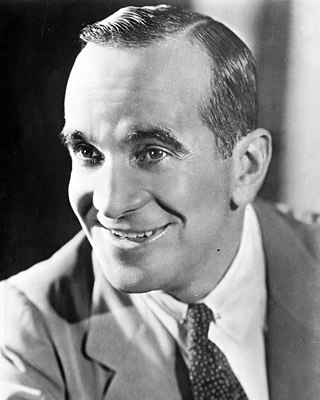
Al Jolson was an American singer, actor, and vaudevillian.
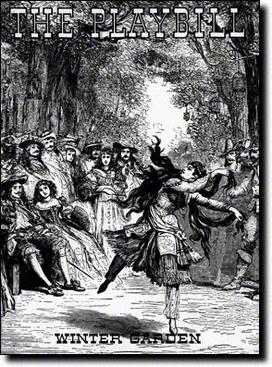
The Ziegfeld Follies of 1936 is a musical revue with lyrics by Ira Gershwin, music by Vernon Duke and sketches by Gershwin and David Freedman. The Ziegfeld Follies were a series of revues presented from 1907 through 1931, 1934, 1936, 1943, and 1957.

My Man is a 1928 black and white sound part-talkie American comedy-drama musical film directed by Archie Mayo starring Fanny Brice and featuring Guinn "Big Boy" Williams. In addition to sequences with audible dialogue or talking sequences, the film features a synchronized musical score and sound effects along with English intertitles. The soundtrack was recorded using the Vitaphone sound-on-disc system.
Vera Violetta was an operetta including a libretto by Louis Stein and music by Edmund Eysler, additional music by George M. Cohan, Jean Schwartz and Louis A. Hirsch. Set in Paris, the work is about the flirtatious wife of a professor. Vera Violetta was the name both of her Roger & Gallet perfume and a waltz which celebrated it.

Harry Pilcer was an American actor, dancer, choreographer, and lyricist.
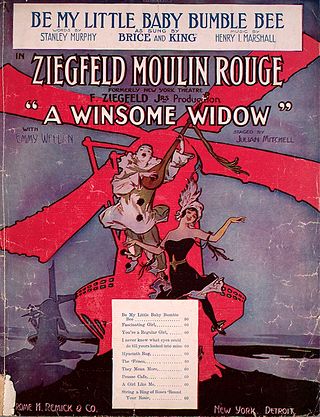
A Winsome Widow is a 1912 musical produced by Florenz Ziegfeld, Jr., which was a revised version of Charles Hale Hoyt's 1891 hit, A Trip to Chinatown, with a score by Raymond Hubbell.
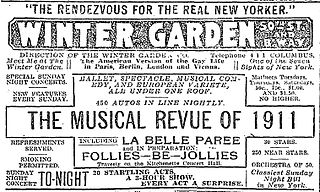
La Belle Paree was a musical revue that launched the legitimate theatre career of Al Jolson. The book was by Edgar Smith, music by Jerome Kern and Frank Tours and lyrics by Edward Madden. Billee Taylor provided additional music and lyrics, and M. E. Rourke and Frederick Day provided additional lyrics. It premiered on Broadway in 1911. The musical is set in Paris, France.
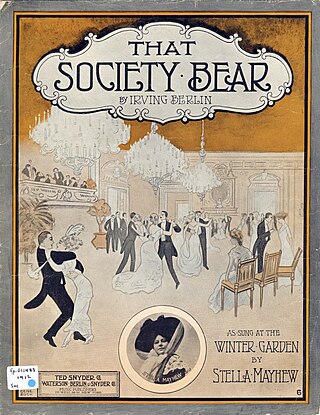
The Whirl of Society was a satirical Broadway musical that played at the Winter Garden Theatre from March 5 to June 29, 1912. Louis Hirsch composed the music with lyrics by Harold Atteridge, to a book by Harrison Rhodes. The production also featured songs by Arthur Fields. The Whirl of Society was part of a production also featuring Sesostra and A Night with the Pierrots, for 136 productions. The musical is set in New York City and takes place in the drawing room and ball room of Mrs. Dean.
Harry Delf was an American comedian, stage actor, playwright, both a screen writer and director of short films, theatrical producer, and lyricist and composer for musicals. He is best remembered as the author of the play The Family Upstairs (1925) which has been staged on Broadway twice and adapted into a film multiple times. As a comedian and stage actor he performed in vaudeville and on Broadway.
References
Citations
Bibliography
- Brayshaw, Emily. "Extravagance, Expense, and Notoriety in Costume: Gaby Deslys and Parisian Modernity on the American Stage, 1911-1914". In McNeil, Peter; Pantouvaki, Sofia (eds.). Performance Costume: New Perspectives and Methods. Bloomsbury Publishing. ISBN 9781350098817.
- Cullen, Frank; Hackman, Florence; McNeilly, Donald (2007). "Al Jolson". Vaudeville, Old & New: An Encyclopedia of Variety Performers in America, Volume 2. Routledge.
- Dietz, Dan (2021). "The Honeymoon Express". The Complete Book of 1910s Broadway Musicals. Rowman & Littlefield Publishers. ISBN 9781538150283.
- Fisher, James (1994). Al Jolson: A Bio-Bibliography. Bloomsbury Academic. ISBN 9780313286209.
- Green, Stanley (1984). "The Honeymoon Express". The great clowns of Broadway. Oxford University Press. ISBN 9780195034714.